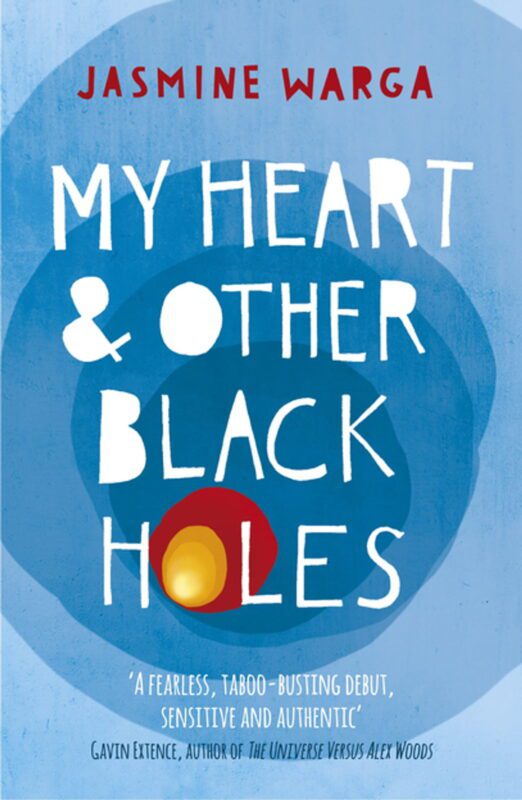Book Reviews
My Heart and Other Black Holes- Jasmine Warga: A Review by Talitha Edim Etta
Jasmine Warga’s My Heart and Other Black Holes is a debut Young Adult novel first published in 2015 by HarperCollins. The novel revolves around the life of Aysel Seran, a sixteen-year-old Turkish-American girl living in Kentucky, United |States of America. Aysel (pronounced as Uh-zel) is forced to live the life of an outcast after her father is sent to prison for murdering her town’s teen golden boy and aspiring Olympian; TimothyJackson. She is shunned at school and has a strained relationship with her mother and her stepfamily and is left feeling like a third wheel and a painful reminder to her mother of her father’s dirty crime. All these factors pile up and choke Aysel into a depressive state. To cope, she fantasizes and eventually plans out her suicide with a boy, Roman, whom she finds on a website, ‘Smooth Passages’ under the handle ‘FrozenRobot’, for people who plan on ‘offing’ themselves. They set the date for their joint suicide on 7th April.
Roman, a supporting character, though not explicitly stated in the novel, suffers from some sort of Post-Traumatic Stress Disorder (PTSD). His trauma stems from his blaming himself for his younger sister’s death after an accident caused by neglect on his part. Guilt-ridden, he spirals down the suicidal path. The date 7th April and their planned method of suicide are specifically chosen by him to imitate his sister’s accident.
The novel plays around with deep themes such as suicide, depression, murder, grief, self-harm etc. but central themes in the book, despite its aura of gloom are hope for the future despite the gloomy present, change and the will to change. In essence, ‘even though things are bad at the moment they will get better so you got to keep going’.
A defining feature of the novel is that it does not act as a therapeutic book in the sense that it speaks negatively of suicide or actively tries to prevent suicide. It is not a suicide ‘help book’. Rather than analyse the themes of suicide and depression from a witness’ point of view, it analyses suicide from the victim’s point of view. Through Aysel and Roman, the readers are able to put themselves in the shoes of suicidal and clinically depressed people. By making the characters regular teenagers plagued with unfortunate events in their lives, the novel communicates that suicide and depression are regular occurrences in everyday lives. Through the characters, Roman and Aysel’s disassociation from family and other aspects of social life, more light is shed on just how deeply mental illness affects not just people’s lives, but their relationships with family, friends etc.
The novel, written from the first person’s point of view, imitates the writing style of John Greene’s Looking for Alaska as it begins with a daily countdown. The novel opens with the date ‘Tuesday, March 17th’ and the countdown ’26 days left’. This serves to present the novel as, from the very beginning worth the read to the reader as they are left intrigued with what would happen in twenty-six days. As the story progresses, so does the countdown until the final day comes and the story reaches its climax.
One thing I appreciate most about the novel is the introspective sense in the characters Aysel and Roman. Both characters are in every sense aware of all their thoughts and actions and do not shy away from openly expressing them (to each other at least). Both of them are aware of their mental illness and their want to end everything. They are not stuck in a position of blankness where they do not know what is wrong with them and how to cope with their feelings. Aysel often delves into descriptive monologues and rants about her condition, often quoting authors or using her vast brilliant scientific knowledge (particularly her obsession with physics) to better understand her feelings and elaborate on her feelings to the readers. Most notably is her comparison of her ‘sadness’ to a giant black slug living in her stomach, waiting to eat out every ounce of happiness in her.
Unlike Aysel, Roman takes a less poetic, ‘realistic’ approach to his introspection. On their first meeting, upon finding his suicide partner, Aysel, a girl, he explains that “Girls just think about doing it while boys actually do it”. He understands that he’s depressed and he understands that he wants to ‘off’ himself. “He’s fucking sad. That’s it”. As someone who’s suffered bouts of depression and the occasional suicidal thoughts, failed attempts etc. I found this a very relatable and realistic portrayal of people suffering with such mental illnesses. When plagued with suicidal thoughts, one usually finds themselves with a sense of heightened awareness and introspective sense.
When the countdown ends, the novel ends beautifully with both characters coming to the realization that yes, they are both broken people, but the ability to change for the better lies in their hands and they must strive to ensure that they become better. In the words of Tabitha Foster from the Netflix series, Trinkets, “It’s not enough to know that you’re broken. You have to do something to fix it.”
“He’s no longer the person I want to die with; he’s the person I want to live with.”
“I’m not asking you to live for me. Even though that would be nice because I’m in love with you. I want you to live for you because I know there’s so much more for you to discover and experience. And you deserve it, you might not think you do, but you do. I’m here to tell you that you deserve it.”
Aysel and Roman’s lives, intertwined by the oddest, undoubtedly morbid manner, are forever changed as throughout the novel, together they realize that there are still some things worth living for, that there are people worth living for too. And of course, they have to live for themselves.
The novel ends on an inspiring note to those experiencing mental illnesses such as depression or suicidal thoughts or those who know people going through such dark times, emphasizing on the, though seemingly impossible, will and ability to change and get better. Jasmine Warga has successfully written a young adult novel that so accurately deals with melancholic themes, the victims’ responses and healthy ways to overcome the overall feelings of emptiness and bleakness caused by them. If I were to rate this book, I would give it a solid eight out of ten.
About the Writer: Talitha Edim Etta is from Calabar, Cross River State and is seventeen years old. Currently, she is in her first year of university and studies International Law and Diplomacy at Babcock University, Ogun State. She enjoys reading contemporary African novels (her favourite author is definitely Chimamanda Ngozi Adichie), writing collections of short stories, watching cartoons and scrolling through TikTok. She doesn’t exactly know what she wants to do when she’s older, but it’s something along the lines of being an author or working wherever people with degrees in International Law and Diplomacy work. She can be contacted on Instagram @talithaaa_a.



This review is so well articulated I want to immediately read the book